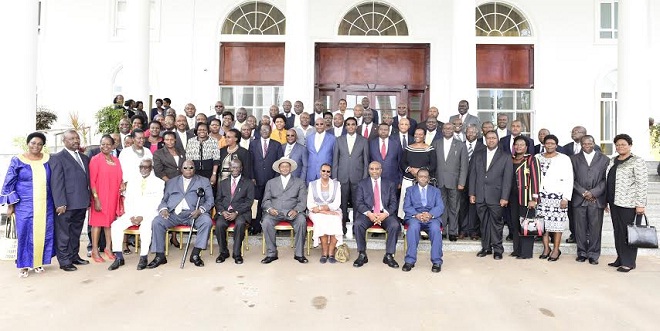
The following year, the governor of the Central Bank, Emmanuel Tumusiime-Mutebile also called on government to reduce the fiscal deficit, which was being driven by ever increasing Public Administration expenditure and thereby increasing inflationary pressures.
Despite being raised severally, these concerns remained largely ignored and the public administration sector has only continued to expand. It is on the basis of this that many remain pessimistic about Saleh’s proposals.
Details of Saleh Dossier
Sources have also told The Independent that the Saleh team was aware that their proposals would attract backlash, and had plans in place to defeat any opposition. They also proposed that the reform of the public service is phased. But since it came out, the dossier has attracted reactions the team did not anticipate.
One of the main recommendations of the Saleh team was that government ministries, departments, and agencies whose functions are undesirable, overlap, or are duplicates should be dissolved or merged and only those that are unique in nature are retained.
It was also recommended that since these agencies are established by law, they should be legally dissolved through an act of parliament called a “Unitary Public Agency Law”. It was further proposed that all Agencies, Authorities and Commissions would henceforth be subject to this law.
The Saleh team made these recommendations after finding that most of the wasteful agencies were designed to “limit political interference” in their operations.
“Agencies took advantage of this to detach themselves from effective supervision and control of their mother ministries,” the Saleh report noted, “They defied coordination and caused ‘Mandate Wars’ leading to poor service delivery.”
The Saleh memo exposed duplications and overlaps in ministries, departments and agencies, wasteful spending, a bloated and highly irrationalized wage bill, and how government has been turned into projects and consultancies.
The dossier notes that while government had in early 1990s decided to shift public service delivery and regulatory oversight to semi-autonomous agencies on the urging of donors, Uganda’s experience with the mushrooming agencies has not been good.
“Service delivery is poor, the cost of running government has increased, and agitation for higher wages has heightened,” the dossier notes, “More worryingly, political leaders who account to the public have lost control over the technocrats.”
It added that while other countries that implemented similar reforms had experienced similar problems, they had since reformed to improve public service delivery.
Amongst these countries, the dossier cites, Australia, New Zealand, USA, the United Kingdom, Jamaica, and Ethiopia among others.
As a result of a bloated government, the Saleh dossier shows that Museveni’s government swallows a total Shs3.36 trillion in wages, of which Shs1.7 trillion (51%) is paid to workers in central government (including agencies) and Shs1.6 trillion (49%) to Local Government workers.
It revealed that agencies spend 10% more on salaries than the mainstream public service, yet they employ fewer people.
It noted that what it termed as the ‘money-consuming’ Agencies are spending 15 times more on their employees compared to the money-generating Parastatals.
In absolute terms, MUK, URA, KCCA and UNRA are the top spenders on salaries.
Universities, research institutions, commissions and parliament spend over 66% of their budgets on salaries and allowances. As debate on reforming these entities goes on, parliament is constructing chambers that can accommodate about 500 legislators.
“Why should small Uganda have 500 legislators,” one of the backers of Saleh’s proposals wondered, “Our economy is too small, we cannot afford these sorts of things.”
Mainstream government spends a relatively lower proportion of their budgets on workers.
It showed that general staff salaries in Ministries are dwarfed by salaries for contract staff.
As an example, the dossier shows that the Finance Ministry spends Shs4.3bn on staff salaries and a whopping Shs.18.7bn on contract staff salaries. While the Health Ministry’s staff salary bill was Shs 5.8bn, contract staff swallowed a whopping Shs16.7bn.
The report also revealed that duplication of functions was spreading limited resources so thinly.
In agriculture, for instance, the dossier shows that resources meant for provision of inputs to farmers, totaling UGX 482.9 billion, were scattered among 17 MDAs in FY 2016/17.
 The Independent Uganda: You get the Truth we Pay the Price
The Independent Uganda: You get the Truth we Pay the Price




Good analysis , I hope this good observations are taken into consideration by all stakeholders in public administration sections !